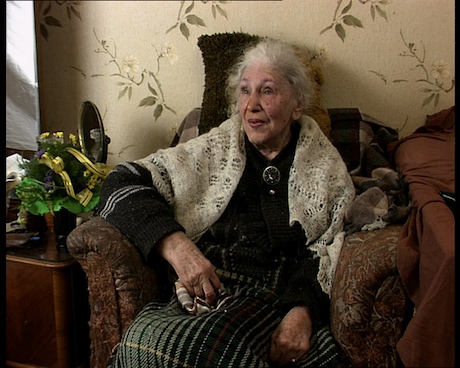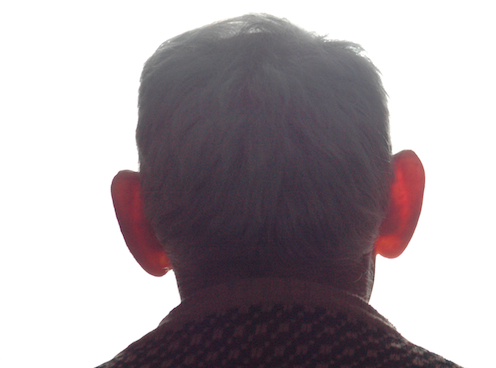Spell Your Name
Full Description
In today’s Kiev, masked characters in colorful traditional attire dance in a circle for the winter celebration of Koliada; one dancer steps forward, pulls fake products from his pockets and begins a barter monologue, enacting the traditional stereotype of “the Jew.” A white onion sits on a glass of water. A rusted-to-flakes mezuzah barely clings to a boarded-up doorway. A gray, icy river flows past nondescript Soviet-era apartment blocks as an elderly woman’s voice articulates each letter of her name. Sergey Bukovsky is one of Ukraine’s leading documentary filmmakers, with more than 50 works to his credit. His new impressionistic documentary explores the fragile legacy of the Holocaust in Ukraine, as crafted from survivors’ and rescuers’ testimonies preserved in the USC Shoah Foundation Institute for Visual History and Education. It’s a history that has been nearly erased by time and political forces; to reclaim it, Bukovksy combines contemporary images and Soviet World War II footage into a visually poetic mashup of Jewish history, personal witness, post-Soviet society and contemporary Ukraine. Bukovsky takes the viewer on a journey of discovery as he and several Ukrainian students absorb the testimony of people who escaped execution (including at the notorious mass grave Babi Yar), and those who rescued friends and neighbors. An elderly couple, Zlata and Haim Mednick, welcome the filmmakers into their apartment, converted from a former synagogue in an anonymous town, but decline to talk about the past. They silently pop up in sepia-toned stop-action throughout the film, like ghosts.
Filmmaker Bio(s)
from 2008 festival: Director, Soviet Union (former)
Sergey Bukovsky was born in 1960 in Bashkiria, the autonomous republic of the former Soviet Union. That same year, his father, film director Anatoly Bukovsky, and mother, actress Nina Antonova, brought him to Kiev.
There was always a crowd of guests in our one-room flat; they were my parents’ friends. They would come together to celebrate either the first or the last day of filming, or the presentation of a film to the State Film Committee of the USSR, or dubbing, or additional filming, or the long-awaited start of distribution.
My first childhood memories are associated with a trip to Baturin, where my father shot the film Buryan (The Weeds). I remember the sugary-sweet smell of makeup, the noise of the lighting trucks, and my father shouting, "Action!" I remember crying when a heroine was "killed" and yelling, "Vermin!"…
Sergey Bukovsky studied directing in the Film Department at the Karpenko-Karyi Kiev State Institute of Theatrical Arts. After serving in the Soviet Army, he worked at the Ukrainian documentary film studio for more than a decade.
The 20-minute black-and-white film Tomorrow is a Holiday, shot in the first years of perestroika, received critical acclaim from the press, the film community, and audiences.
During his 25-year film career, Bukovsky has made approximately 50 documentary films. Some of them received awards at prestigious international film festivals. They include: Tomorrow is a Holiday (1987), Roof (1990), Dislocation (1992), The Hyphen (1992), To Berlin! (1995), Vilen Kalyuta. Real Light (2000), Terra Vermelha. Red Land (2001), and the 9-part documentary series for television War. The Ukrainian Account, which was awarded the National Taras Shevchenko Prize of Ukraine in 2004.
The difficulty in talking about this film (War. The Ukrainian Account) is that it is not only important as a cinematographic or television event… In Sergey Bukovsky’s film, for the first time, Ukraine acquires its own history of War World II. The history that is not rolled up into the ideological asphalt for a military parade… The history that is not hastily-fastened with white threads of politics… It is a genuine documentary epic, in which history is presented accurately: as the tragedy of millions of human lives bloodied by the tornado of war. It is a history of total betrayal. It is a history of a nation betrayed by its authorities. It is a history of a nation that betrayed its own past.
(Anna Sherman, "Telekritika" / 08.11.2002)
From 1998 to 2003, Bukovsky taught courses in documentary directing at the Karpenko-Karyi Kiev State Institute of Theatrical Arts.Director, Soviet Union (former)
Sergey Bukovsky was born in 1960 in Bashkiria, the autonomous republic of the former Soviet Union. That same year, his father, film director Anatoly Bukovsky, and mother, actress Nina Antonova, brought him to Kiev.
There was always a crowd of guests in our one-room flat; they were my parents’ friends. They would come together to celebrate either the first or the last day of filming, or the presentation of a film to the State Film Committee of the USSR, or dubbing, or additional filming, or the long-awaited start of distribution.
My first childhood memories are associated with a trip to Baturin, where my father shot the film Buryan (The Weeds). I remember the sugary-sweet smell of makeup, the noise of the lighting trucks, and my father shouting, "Action!" I remember crying when a heroine was "killed" and yelling, "Vermin!"…
Sergey Bukovsky studied directing in the Film Department at the Karpenko-Karyi Kiev State Institute of Theatrical Arts. After serving in the Soviet Army, he worked at the Ukrainian documentary film studio for more than a decade.
The 20-minute black-and-white film Tomorrow is a Holiday, shot in the first years of perestroika, received critical acclaim from the press, the film community, and audiences.
During his 25-year film career, Bukovsky has made approximately 50 documentary films. Some of them received awards at prestigious international film festivals. They include: Tomorrow is a Holiday (1987), Roof (1990), Dislocation (1992), The Hyphen (1992), To Berlin! (1995), Vilen Kalyuta. Real Light (2000), Terra Vermelha. Red Land (2001), and the 9-part documentary series for television War. The Ukrainian Account, which was awarded the National Taras Shevchenko Prize of Ukraine in 2004.
The difficulty in talking about this film (War. The Ukrainian Account) is that it is not only important as a cinematographic or television event… In Sergey Bukovsky’s film, for the first time, Ukraine acquires its own history of War World II. The history that is not rolled up into the ideological asphalt for a military parade… The history that is not hastily-fastened with white threads of politics… It is a genuine documentary epic, in which history is presented accurately: as the tragedy of millions of human lives bloodied by the tornado of war. It is a history of total betrayal. It is a history of a nation betrayed by its authorities. It is a history of a nation that betrayed its own past.
(Anna Sherman, "Telekritika" / 08.11.2002)
From 1998 to 2003, Bukovsky taught courses in documentary directing at the Karpenko-Karyi Kiev State Institute of Theatrical Arts.
Director(s)
Country(ies)
Language(s)
w/English Subtitle
Release Year
Festival Year(s)
Running Time
89


